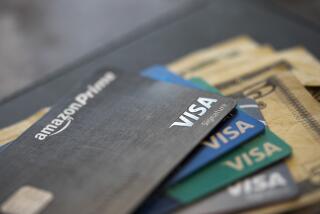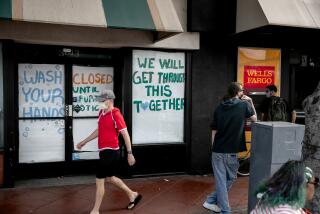Credit Becomes Harder to Find
- Share via
Banks made it tougher for businesses to borrow and tightened credit card lending for consumers after the Sept. 11 terror attacks, although they kept home loans flowing, a Federal Reserve survey showed Tuesday.
The Fed’s quarterly survey of senior lending officers, taken in October, confirmed reports from businesses and such groups as the National Assn. of Manufacturers that credit has become harder to get after easing a bit during the middle of the year.
Underscoring the severe damage caused by the attacks, demand for business loans fell to the lowest level since late 1991, when the Fed’s survey of loan officers took its present form. With companies putting off expansion and proceeding cautiously in the downturn, more than seven in 10 domestic loan officers reported weaker demand for commercial and industrial loans from large and mid-size customers, compared with about half in the survey released in August.
The Fed’s report Tuesday showed that about 50% of the domestic banks surveyed tightened credit to large and mid-size businesses--those with annual sales of at least $50 million. That was up from 40% in the previous survey.
Of the 57 U.S. banks polled, 28 had “tightened somewhat” the availability of loans, one toughened its standards “considerably” and 28 said policies had not changed. The survey said 14 of 22 foreign-based banks operating in the U.S. “tightened somewhat” in the last three months, while one “tightened considerably.”
About 40% of the domestic banks tightened credit for small businesses, up from 32% in the previous survey.
“All survey respondents pointed to a less favorable or more uncertain economic outlook as at least a somewhat important reason for changing their commercial lending policies,” the Fed said. Indeed, 63% of domestic banks said it was a “very important” factor, up from 37% in August.
Besides requiring businesses to be stronger to qualify for loans, many banks widened the gap between their cost of funds--what they pay for deposits--and the interest rates they charge. That helps make up for the higher risks banks run as the economy weakens, but it also could restrain business growth, delaying a recovery.
Most evidence shows recession has set in, according to the National Bureau of Economic Research, an authoritative panel of economists. Three of four major indicators the group tracks--industrial production, jobs and trade--are in recession. The fourth, income levels, is not yet at recession levels, the group said Tuesday.
The Fed’s survey also found that one in five banks reported tighter standards for credit card and other types of consumer loans during the last three months. Standards for approving residential mortgages, however, didn’t change during the period.
The Fed said 25% of banks surveyed reported weaker demand for consumer loans, but mortgage demand was steady. Housing markets until recently had been a bright spot in a weakening economy, and extremely low interest rates have kept refinancings at record levels while propping up home sales by making loans affordable.
Noting that credit-rating agencies have stepped up downgrades of corporate debt, the Fed survey asked extra questions about banks’ internal ratings of their lending risks.
Not surprisingly, 30% of domestic banks and 40% of foreign ones had “considerable” downgrades to airlines. Other sectors with major downgrades were travel and leisure services, technology firms and auto makers and distributors. Only the energy and defense sectors avoided widespread downgrades.
More to Read
Inside the business of entertainment
The Wide Shot brings you news, analysis and insights on everything from streaming wars to production — and what it all means for the future.
You may occasionally receive promotional content from the Los Angeles Times.











